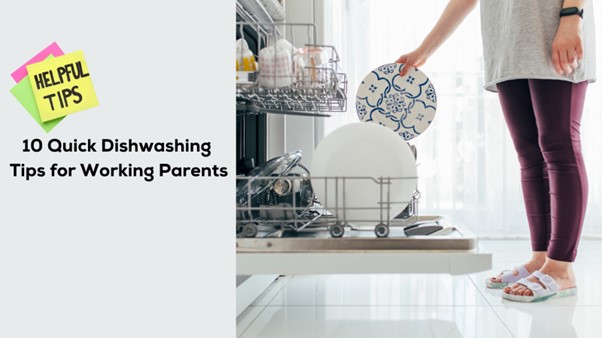
10 Quick Dishwashing Tips for Working Parents
Balancing work, family time, and household chores can be a constant challenge for busy parents. With hectic schedules, efficient dishwashing is often neglected. Quick and effective dishwashing habits, however, can greatly reduce stress while saving time and energy in the kitchen. This article provides useful tips for working parents to master the art of speedy dishwashing.
The Importance of Efficient Dishwashing for Busy Lives
The daily struggle between work, childcare, school activities, and household chores leaves little time for relaxation for most working parents. With loaded schedules, dishwashing is considered a rush through haphazardly. However disorganized dishwashing habits can allow piles of dirty dishes to accumulate and become a source of chaos in the kitchen.
An Energy Star-certified dishwasher uses less than half of the energy compared to washing dishes by hand, saving more than 8,000 gallons of water each year.
Implementing efficient dishwashing processes can minimize the time and energy spent in the kitchen. This provides working parents with extra time for family bonding, personal hobbies, or simply unwinding.
Starting with a Clean Slate
Begin each morning by emptying the dishwasher and clearing the sink before starting your daily kitchen routine. Having an empty sink and dishwasher helps maintain order amidst the morning rush.
Using a dishpan to collect dirty dishes as they accumulate can save both water and time, as opposed to using a large sink for just a few items. This also sets a positive tone for the day by completing a small but satisfying chore first thing in the morning.
Creating Hybrid Spaces for Dishwashing
Be strategic about setting up these hybrid spaces. If you have a large kitchen farmhouse sink, keep a dishpan on the counter next to your main food preparation zone. When cooking ingredients, transfer used tools like knives and measuring cups right into the water to soak.
Designate separate spaces in your kitchen for cooking and dishwashing to allow both tasks to happen in tandem. Use dishpans for accumulating dirty dishes, even with a double sink.
Using dishpans, even with a large or double sink, can protect dishes from potential chips that might occur when they come into contact with harder surfaces like stainless steel, stone, or porcelain. This hybrid space lets you wash dishes as you go without interrupting food prep. It also reduces after-meal cleanup time.
Dishwashing as a Bonding Activity
Involve children in dishwashing to turn it into a fun family bonding ritual. Give each child an age-appropriate task like rinsing, drying, or putting away dishes. Supervise carefully, and make it fun by singing songs or telling stories.
The EPA estimates that a household saves 10 days a year using an efficient dishwasher compared to doing it all by hand. This saved time can be utilized for family bonding. Kids learn responsibility through hands-on chores while spending quality time with their parents.

Don’t Rinse Your Plates’ Method
Modern dishwashers have advanced sensors and wash cycles designed to clean dried-on food residues. So pre-rinsing dishes is an unnecessary waste of time and water. Simply scrape off any solid residues before loading.
Skip the pre-wash and put dishes directly into the dishwasher, even with stuck-on food. This one tip alone can cut dishwashing time significantly for busy parents.
Things to Avoid for Efficient Dishwashing
Certain common practices can greatly reduce the efficiency of dishwashers:
Improper loading: Dishes should be securely placed with ample space for water circulation. Place bowls, pots, and pans face down—angle dirty dish surfaces towards water jets for direct spray.
Overcrowding: Leave adequate room between dishes for water to spray from all directions. Avoid packing dishes too close together. This also prevents nesting and the occlusion of dirty surfaces.
Dish placement: Never place dishes or utensils inside other items like bowls or pots. This can prevent effective cleaning.
Blocking spray arms: Keep the bottom spray arm clear by placing platters and large items along the edges. Do not let the cutlery basket obstruct the bottom spray arm.
Small items in racks: Small items like measuring spoons can fall through racks if placed improperly. Use a utensil caddy or mesh bag to keep them contained.
Towels or scrub pads: Never wash linen items or scrub pads in the dishwasher. They can get jammed into pumps. Only wash dishwasher-safe items.
No rinsing aids: Lack of a rinse aid prevents spotless drying. Always use rinse aids, dishwasher salts, and dishwasher detergents as per manual guidelines for optimal performance.
Being mindful and careful while loading the dishwasher can significantly reduce dishwashing time and enhance efficiency for busy parents. Avoiding these common mistakes ensures properly washed dishes after every cycle.
Maximizing the Use of Your Dishwasher
For busy families, a dishwasher is a lifesaver compared to hand washing. But to maximize efficiency:

Source: Energystar.gov
- Scrape dishes instead of pre-rinsing to save water and time. Simply scrape off chunks of food before loading.
- Choose the right cycle based on load and soil levels. The normal process is fine for regular use. Heavy or Pots & Pans cycles are suitable for more soiled dishes.
- Use correct detergents, like packs, gels, or powders recommended for dishwashers, to prevent issues. Avoid hand dishwashing liquid.
- Allow dishes to air dry instead of hand drying to save time and prevent spotting. Open the dishwasher door slightly after the cycle to circulate air.
- Clean filters regularly to maintain water spray pressure. Remove and clean filters every few weeks, as per the manual.
- Use rinse aids to prevent water spots and improve drying. Check rinse aid levels regularly.
- Add dishwasher salt if you have hard water. It prevents scale buildup and improves cleaning.
- Run full loads to optimize water and electricity usage. Wait until you have a full load instead of frequent partial loads.
Following these best practices improves cleaning performance while maximizing the efficiency of your dishwasher.
Pro Tip: Run the dishwasher only when fully loaded. Partial loads waste water and electricity.
Other Kitchen Items to Clean Alongside Dishes
Expand your dishwashing routine to include other frequently used kitchen items, like:
- Kitchen tools and gadgets
- Cutting boards, rollers, and racks
- Small appliances like blenders, juicers, etc.
- Coffee mugs and water bottles
Washing these items alongside your dishes prevents the buildup of grime and germs, which can occur due to constant contact with food.
Concluding Thoughts
Amidst their packed routines, working parents can still implement efficient dishwashing processes in their kitchens. Consistent use of these dishwashing best practices can gradually create stress-free mealtimes and easier cleanups for busy families. The long-term time and energy savings also enable parents to spend more quality time with each other and their children.
What tips do you use to make dishwashing faster and easier for your family? Implementing even a few quick dishwashing hacks can greatly enhance your kitchen routine. Share any of your tips and tricks in the comments below!
FAQs
Is it really necessary to pre-rinse dishes before loading them into the dishwasher?
Pre-rinsing is generally unnecessary with modern dishwashers. The machines are designed to remove all food residues without this extra step. Skipping pre-rinsing saves significant time and water.
How can I involve my children in the dishwashing process without compromising on safety?
Give children plastic items to rinse or have them help load the dishwasher. Closely supervise the use of sharp objects. Provide gloves for protection.
Are there any specific products or tools that can make dishwashing faster and more efficient?
Quality brushes, sponges, gloves, and drying racks can help. For dishwashers, rinse aids, cleaning tablets, and condenser balls improve performance.




